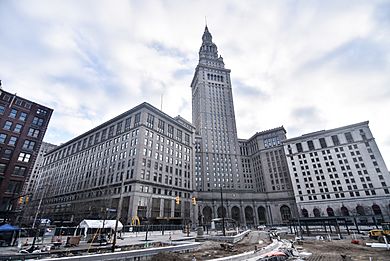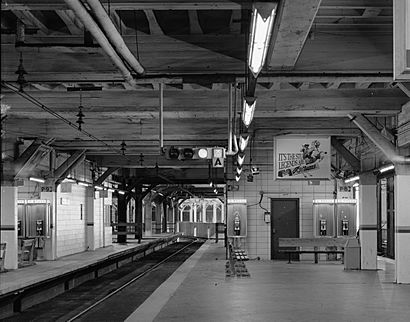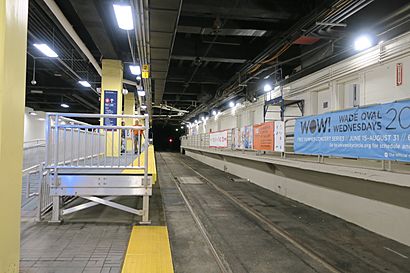Tower City Center facts for kids
Quick facts for kids
Tower City Center
|
||||||||||||||||||||||||||||||||||||||||||||||||||||||||||||||||||||||
|---|---|---|---|---|---|---|---|---|---|---|---|---|---|---|---|---|---|---|---|---|---|---|---|---|---|---|---|---|---|---|---|---|---|---|---|---|---|---|---|---|---|---|---|---|---|---|---|---|---|---|---|---|---|---|---|---|---|---|---|---|---|---|---|---|---|---|---|---|---|---|

View from Public Square
|
||||||||||||||||||||||||||||||||||||||||||||||||||||||||||||||||||||||
| Location | 230 West Huron Road, Cleveland, Ohio |
|||||||||||||||||||||||||||||||||||||||||||||||||||||||||||||||||||||
| History | ||||||||||||||||||||||||||||||||||||||||||||||||||||||||||||||||||||||
| Opened | June 29, 1930 (Terminal) | |||||||||||||||||||||||||||||||||||||||||||||||||||||||||||||||||||||
| Closed | January 14, 1977 (Terminal) | |||||||||||||||||||||||||||||||||||||||||||||||||||||||||||||||||||||
| Previous names | Cleveland Union Terminal | |||||||||||||||||||||||||||||||||||||||||||||||||||||||||||||||||||||
|
||||||||||||||||||||||||||||||||||||||||||||||||||||||||||||||||||||||
|
Union Terminal Group
|
||||||||||||||||||||||||||||||||||||||||||||||||||||||||||||||||||||||
| Architect | Graham, Anderson, Probst & White; Walker & Weeks | |||||||||||||||||||||||||||||||||||||||||||||||||||||||||||||||||||||
| Architectural style | Beaux-Arts, Art Deco | |||||||||||||||||||||||||||||||||||||||||||||||||||||||||||||||||||||
| NRHP reference No. | 76001405 | |||||||||||||||||||||||||||||||||||||||||||||||||||||||||||||||||||||
| Added to NRHP | March 17, 1976 | |||||||||||||||||||||||||||||||||||||||||||||||||||||||||||||||||||||
Tower City Center is a big building complex in Downtown Cleveland, Ohio. It's located right on Public Square. This huge place has many connected office buildings. It also includes the famous Terminal Tower, a shopping mall called The Avenue, Jack Cleveland Casino, and the Renaissance Cleveland Hotel.
Tower City Center is also home to Tower City station. This station is the main hub for Cleveland's four RTA Rapid Transit train lines. The whole structure was first built in 1929 and was known as Cleveland Union Terminal. In 1976, it was added to the National Register of Historic Places. This means it's an important historical site.
Contents
Discovering Tower City's Past
How the Rail Terminal Began
The idea for this large building complex came from the Van Sweringen brothers. They were important local business people who developed railroads and real estate. They wanted to create a central train station for all trains coming into Cleveland. This station was called Cleveland Union Terminal (CUT). It was similar to Grand Central Terminal in New York City.
When it was first built, the station had different tracks for different types of trains. Some tracks were for "interurban" or "rapid transit" trains. These were like local trains that connected cities. Other tracks were for "inter-city rail" trains, which traveled longer distances. The Van Sweringen brothers hoped to build many interurban lines from the CUT. They even bought land for these future train lines.
Building the Giant Complex
The design for the complex was made by a company called Graham, Anderson, Probst & White. Work to prepare the land started in 1922. About 2,200 buildings had to be taken down to make space. Construction began in 1926. The main structure was finished by 1927. At that time, it was the second-largest digging project in the world. Only the Panama Canal was bigger!
The Terminal Tower opened in 1928. It was the tallest building in North America outside of New York City until 1964. Three other office buildings were also built. These were the Medical Arts Building, Builders Exchange Building, and Midland Building. These three buildings have a cool design style called Art Deco. They were finished in 1929. The old Hotel Cleveland, built in 1918, was also connected to the complex. Cleveland Union Terminal officially opened in 1930.
The building complex had many shops and places to eat. At first, the Van Sweringen brothers didn't plan to build an office tower. But they later decided to add the 52-story Terminal Tower. It faces Public Square.
In 1931, the Higbee Company department store moved its main shop to a new building connected to the terminal. In 1934, the U.S. Postal Service also moved its main Cleveland office here.
Trains at the Terminal
The Union Terminal served many different train companies. These included the Baltimore and Ohio Railroad, New York Central Railroad, and Nickel Plate Road. Some trains that used the terminal were:
- Cleveland Night Express (traveling to Baltimore)
- Empire State Express (traveling to New York)
- Ohio State Limited (traveling to New York)
- Nickel Plate Limited (traveling to Buffalo)
However, the train companies didn't really like using this station. It was off their usual, faster routes along Lake Erie. Also, trains couldn't use steam power near downtown. This meant trains had to switch to electric power outside the city. Then they had to switch back when leaving. Because of this, some train lines started to avoid the station completely. Some even stopped serving Cleveland.
Also, fewer people were traveling by train. Cars and airplanes became more popular. The Erie Railroad, owned by the Van Sweringens, couldn't afford the electric transfer. They used their own station until 1948. After that, they used diesel trains, which could use the Union Terminal.
In 1971, Amtrak briefly used the Union Terminal. But they found the rent too expensive. So, when a new train service started in 1975, Amtrak built a new station near Lake Erie. The last commuter train service ended on January 14, 1977. This was the end of Tower City Center as a main railroad station.
| Diagrams of former Cleveland area railroad stations | ||||||||
|---|---|---|---|---|---|---|---|---|
|
From Train Station to Shopping Mall
Most of the old train platform area was taken down in the late 1980s. The station area was then changed into a large shopping mall. This mall has three floors and is called The Avenue. It opened on March 26, 1990. As part of this change, the RTA rebuilt its rapid transit station underneath the center. The rest of the old platform area became a parking garage.
When Tower City Center reopened, it had many fancy stores. Over the next 25 years, some of these high-end shops were replaced by more common stores. In 1991, two new 11-story office towers were added. These are the Skylight Office Tower and the Chase Financial Plaza. The Chase Building has the Ritz-Carlton Hotel.
After a nearby sports complex was built in 1994, an indoor walkway connected Tower City to it. Another walkway was built in 2002. This connected Tower City to the U.S. Courthouse.
The Higbee's department store closed in 2002. Later, in 2012, the Higbee Building became the Horseshoe Casino Cleveland. It was later renamed Jack Cleveland Casino in 2016.
Exploring Former Rapid Transit Stations
The Red Line Station
|
Public Square
|
|||||||||||||
|---|---|---|---|---|---|---|---|---|---|---|---|---|---|

Red line platforms
|
|||||||||||||
| Owned by | Greater Cleveland Regional Transit Authority | ||||||||||||
| Construction | |||||||||||||
| Structure type | Underground | ||||||||||||
| History | |||||||||||||
| Opened | March 15, 1955 | ||||||||||||
| Closed | 1980s-1990s | ||||||||||||
| Previous names | Cleveland Terminal | ||||||||||||
| Original company | Cleveland Transit System | ||||||||||||
| Key dates | |||||||||||||
| Interurban platforms built | July 20, 1930 | ||||||||||||
| Platforms rebuilt | 1955 | ||||||||||||
|
|||||||||||||
The Red Line train uses a path that was originally planned for an interurban line. An extra underground space for that line is located at Mayfield Road. This is now the Little Italy–University Circle station.
History of the Red Line
For 25 years, only the Shaker rapid transit used the interurban part of the CUT. In 1955, the Cleveland Transit System built its own rapid transit line, now called the Red Line. This line used much of the land the Van Sweringens had set aside. A new rapid transit station was built in the old interurban area of the CUT for the Red Line.
At that time, the Red Line and the Shaker rapid transit (Green and Blue Lines) were owned by different groups. So, you couldn't transfer between them for free. The stations were completely separate.
In 1968, the Red Line was extended to Cleveland Hopkins International Airport. This made Cleveland the first city in North America where you could take a direct train from downtown to the airport.
Both train lines became part of the Greater Cleveland Regional Transit Authority (RTA) in 1975. The two separate stations finally became one new station on December 17, 1990. This happened when Tower City Center was developed.
The Shaker Rapid Station
|
Tower City
|
|
|---|---|

Temporary platforms in August 2016
|
|
| Owned by | Greater Cleveland Regional Transit Authority |
| Construction | |
| Structure type | Underground |
| History | |
| Opened | July 20, 1930 July 31, 2016 December 28, 2020 |
| Closed | 1980s-1990s November 26, 2016 |
| Previous names | Public Square, Downtown Terminal, Cleveland Terminal |
| Original company | Cleveland Interurban Railroad |
These train platforms opened in 1930. This was when the Cleveland Interurban Railroad extended its line.
History of the Shaker Rapid
The Van Sweringens owned the Cleveland Interurban Railroad. This railroad served the suburb of Shaker Heights. So, the Shaker trains immediately started using the interurban part of the CUT when it was finished on July 20, 1930. Before this, Shaker trains used streetcar tracks to get downtown. This made their trips much slower.
The Shaker rapid transit station was on the northernmost tracks of the complex. It had a small area to store a few trains. It also had a loop for trains to turn around. However, plans for other interurban services stopped because of the Great Depression. This economic crisis hit the Van Sweringens very hard. By 1944, the city of Shaker Heights owned the Shaker rapid transit.
The Shaker and Van Aken lines became part of the Greater Cleveland Regional Transit Authority (RTA) in 1975. The two separate stations remained separate until December 17, 1990. That's when a brand new station was finished as part of the Tower City Center development.
The platform was temporarily opened again for trains going west in 2016 and 2020.
 | Aurelia Browder |
 | Nannie Helen Burroughs |
 | Michelle Alexander |

















